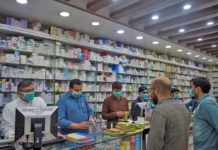More than 200,000 working horses, mules and donkeys work in hazardous industries to support the livelihoods of hundreds of thousands of people. The industries include brick kilns, coalmines and waste management.
Pakistan has 20,000 brick kilns where working animals transport bricks daily. In brick kilns, the animals carry heavy loads and are treated like objects. During the course of work, they face health and welfare challenges due to heavy loads, long working hours, lack of feed and water, lack of shade and shelter in harsh weathers.
According to Brooke Pakistan (an organization that targets health and safety of working animals), there are more than 200 coalmines in Chakwal and Khushab only where there are 6,000 working donkeys. These donkeys go deep inside the mines and carry heavy loads of coal on their back. They face electric shocks, die in mine collapses and are injured in rocky terrains.
In urban and semi-urban areas, one can see donkey carts transporting waste/garbage. In Karachi, these carts transport 4,000 tons of waste out of the total 12,000 tons daily as per Brooke study in 2017. Waste pickers’ responses during the studies show 64% were under 18 years while 75% were below 14. Due to social constraints, the adult male garbage collectors are not permitted inside households. Major security risks in coalmines for workers were mine collapses (99%), electric shock (82%), poisonous gases (79%), slipping in mine and haulage breakdown or trolley incidents.
It was observed that only 43% of animal owners/workers used safety lamps while working in coal mines. Nearly 31% did nothing to protect themselves from security risks in coalmines during work; 55% of animal owners reported they had no safety kit at coalmines for people; 92% of animal owners reported they had no safety kit for their animals in case of issues in brick kilns, foot injuries due to bricks, bricks falling, animals fighting with each other, cart collapses, animal injuries due to harness, animal bites, slip disk and brick kiln/coal mines’ walls falling down.
While talking to Minute Mirror, one Shehzad, who works in a brick kiln said that during summers, when temperature was very high and work burden heavy, they were unable to manage water and food for their animals. He said that there were many departments but no field forces visited them in emergencies. In case of emergencies, if field forces from livestock department reached the spot, he added, they were usually unaware of medications and treatment after first aid.
He added, “We are living in such miserable condition that despite our will, we cannot manage health of our working animals due to the lack of resources.” When Minute Mirror approached Rescue Punjab Director General Dr. Rizwan Naseer, he said rescue service had rescued 32,465 animals till now in emergency and they tried to respond to every call to provide first aid. “In case of animal rescue call, the biggest challenge we face is where to keep them for further treatment after giving first aid,” he added.
Naseer further said that unfortunately, there were no shelter homes for extensive treatment of working animals. While answering a question, he said, “There is a big confusion in the helpline of rescue and livestock. The rescue helpline for missing persons is 1192 and helpline of livestock department for animals emergency is 9211. People usually confuse these helplines and they face delay in response.”
While talking exclusively to Minute Mirror, Director Livestock Dr. Zubair Bari said facilities were available “but we lack strong linkages between all departments working for the same cause”. He added that the department did not have enough medicines for horses and mules because it mostly bought medicines for other animals of livestock. He promised that the department would soon make a strategy and would strengthen liaison with all other organizations and donors to buy medicines for working animals.
While explaining the issue, Director Environment Protection Naseem Shah told Minute Mirror that due to brick kilns’ smoke, “we banned brick kilns but we have seen that due to poverty, the owners of working animals fail to maintain the health of their animals. Therefore, we installed steam system for the safe operations of these brick kilns”.
“We have observed that animals working on these sites are also badly affected by poisonous gases and smoky environment,” Shah added.
While giving interview to Minute Mirror, Member of Punjab Assembly (MPA) Sadia Sohail said that it was the responsibility of the state to meet the citizens’ basic needs, but they ignored these issues. While explaining, she said that the civil society was playing its role but it could not fulfill the needs because of limited resources.
She added that the government needed to make shelter homes for working animals and there was a dire need to work immediately on their health and safety. She further pointed out that the training of livestock officers was very important to deal with on-ground situations.
In an exclusive talk with Minute Mirror, religious scholar Allama Raghib Naeemi said that Allah had spoken about animals in the Holy Quran two hundred times. He added, “The holy book discusses 35 types of animals while five surahs are titled with animal names, which represents Allah’s love for these creatures.”
He further said that Allah had mentioned accountability in the Quran over negligence of animals and also promised reward for those who were kind to them.







